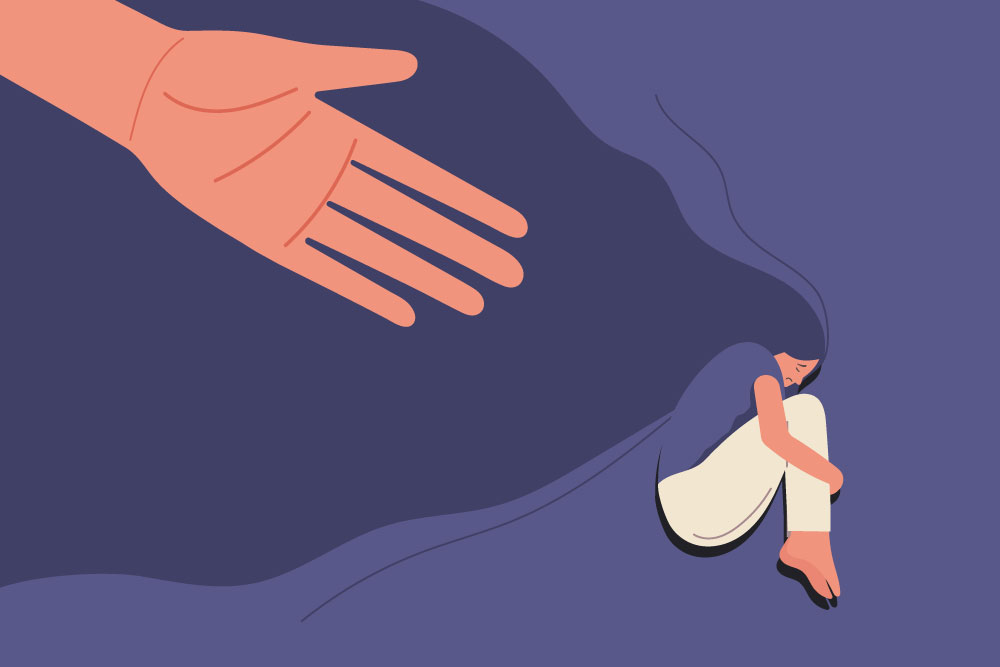Quite often I find myself engaged in a psychic wrestling match with an annoying little voice in my head that compels me to second guess myself and chip away at my confidence and dials up the doubts. What if I mess up? What if the question is a silly one? What If I make a fool of myself? Am I overdressed? What will people say? Maybe I don’t deserve this, I am just not smart enough, talented enough, capable enough, experienced enough? We’ve all been there. Self-doubt creates insecurities and hampers our mental wellbeing. Self-doubt often manifests into depression and anxiety. It’s not who you are that holds you back, it’s who you think you’re not.

We experience feelings of self-doubt. We don't pick up the phone and make that call. We don't extend the invitation. We don't raise our hand for promotion. We are not confident enough to say ‘no’ when needed. We experience feelings of self-doubt with decisions and choices simply because we believe that we’re not good enough. A certain level of self-doubt is good because it indicates that you understand what you need to improve in order to do a better job. But when left unchecked, the fear that fuels our reservations can drive us to be over cautious and keeps us from taking the very actions that would help us. Persistent fear and self-doubt can hugely affect your life in a bad way. On various occasions in my life, I have been guilty of low self-confidence. Doubt sat triumphantly and actions went undone. In my case, self-doubt also led to severe anxiety, lack of motivation and low self-esteem.
So, how do you free yourself from this trap you have built in your head? I’ve shared some ways and habits that have helped me shut down the destructive inner voice and move forward again.
Shower Yourself With Compassion

When we doubt our abilities, it’s often because we don’t want to make any room for mistakes. We all make mistakes along the way and it’s okay to do so. Don’t beat yourself up for beating yourself up, embrace the doubt in your head and use it to your advantage. Acknowledge the shortcomings and ask yourself if it’s really true and if it is then embrace it, challenge it and reclaim the power it has on you
Doubt Your Doubts And Say Stop

Your doubts are not the truth. Rather they are fear-fuelled stories you create about who you are, what you’re worth and what you’re capable of achieving. Be quick to kill that doubtful inner voice, don’t let it spin out of control or grow from a whisper to a stream of discouraging sentences. Talkback and challenge it, by doing so you can disrupt the thought pattern and stop the inner critic from taking over. Prepare a list of positive counter-arguments, things like “I can do this”, “It’s just another chance for me to learn” or “I deserve better and more.”
Revisit The Past

List down your insecurities and fears. Maybe you beat yourself up more often than not in similar situations. You should be able to identify your biggest fears and moments that make you feel stressed. During the review process, you can start to think of ways to solve your problems. It can be “focusing more on myself” or things you think you need to improve on.
Never Compare Yourself To Others

In this world filled with Instagram perfect lives, it’s difficult not to fall for the comparison trap. They say that comparison is the thief of joy. It is important to remember that everyone’s journey and ideas of success are different. You may look at someone else achievements and think this is where you should’ve been but ask yourself is that what you really want and what have you done to achieve it. The best way to way to go about things is instead to compare yourself to yourself. To see how far you have come. To see what you’ve overcome. And to see how you’ve kept going, succeeded and grown as a human being.
Cancel Toxicity

The people you hang out with will either fuel your self-doubt or fuel your confidence. Always surround yourself with people who bring out the best in you and encourage you, make you believe that you can do more, be more and give more. People who give unsolicited advice or are overtly critical should hold no place over you. Avoid people who fuel negativity and make you feel less about yourself.
Acknowledge And Celebrate Small Wins

When you’ve taken one small step forward – it may be as small as your first 5 minutes of run in months or the first time you changed a light bulb, when you’re done with it you have a win. It may be a small one that no one knows about but it’s still a win. So celebrate it. Do a little dance! This will renew and recharge your motivation and make taking action feel more exciting and fun.
Remember Setbacks Are Temporary

Ask yourself, what is one thing I can learn from this setback? Use the mistake or failure to your advantage and move forward once again in a smarter way. Sometimes things go well and sometimes they don't. So don't make a failure a permanent resident in your head.
Seek Help

People who experience chronic self-doubt may experience a wide range of related mental health concerns. Imposter syndrome, also known as the imposter phenomenon, is a specific psychological phenomenon that is linked to self-doubt and can be described as the experience of feeling like a fraud in one’s own eyes. It is typically characterised by extreme criticism of one’s own performance, and anxiety resulting from the fear that others may realise one is not actually as successful as one appears to be. When self-doubt becomes overwhelming or has a negative impact on well-being, seek professional help. Speaking with a trained therapist or a mental health professional may help in strengthen your sense of confidence and develop greater faith in your own abilities, but therapy may be particularly beneficial because a therapist may be able to help an individual discover and address the source of the self-doubt.
It is advisable and recommended to seek expert advice if you are feeling unwell